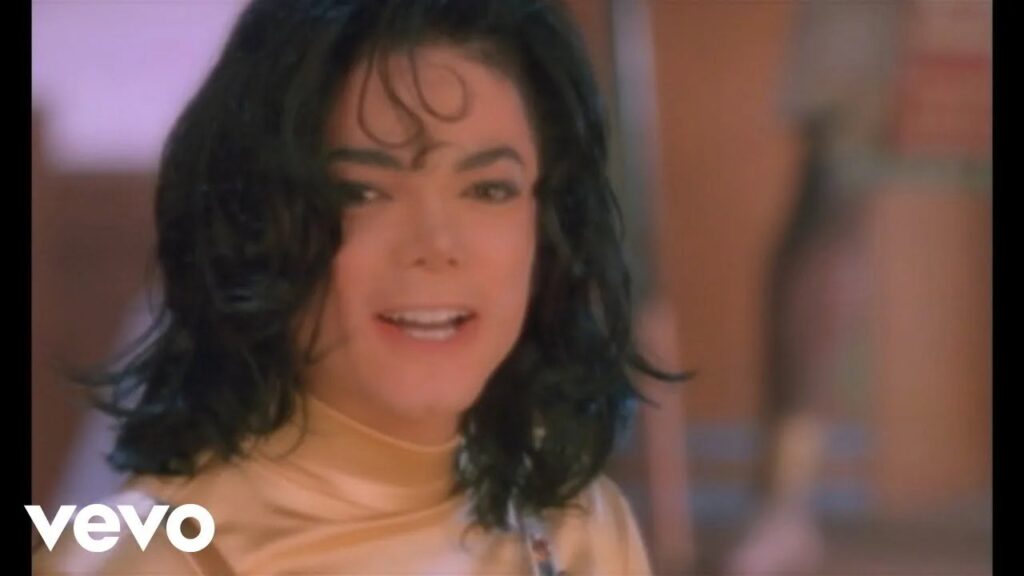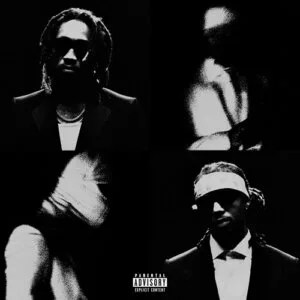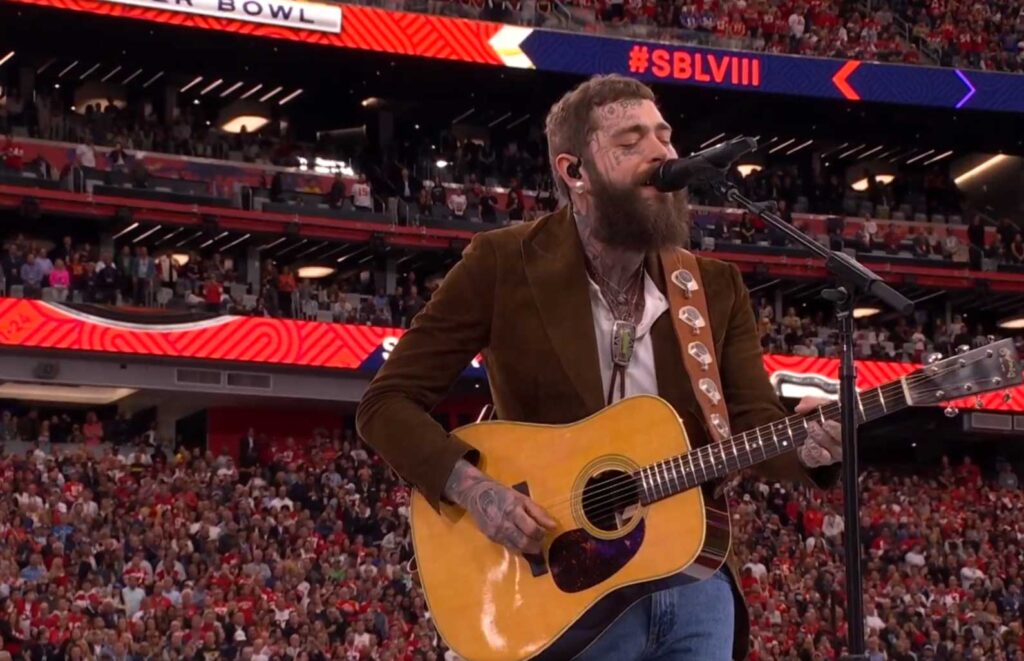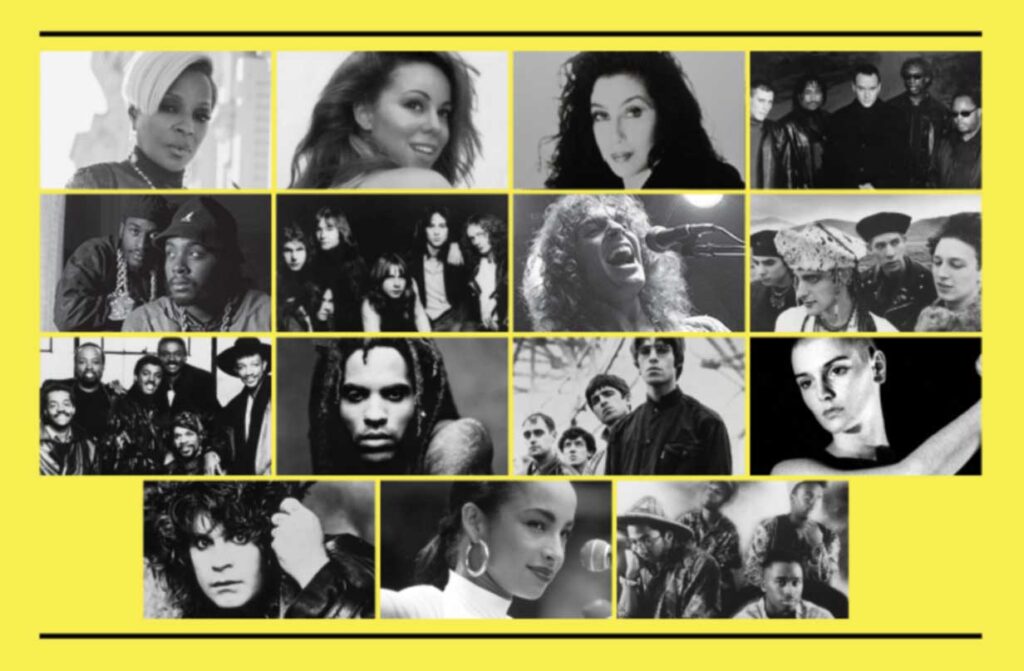Interview: Robert Cray – Hit Channel
Written by nikos on 11 Φεβρουαρίου 2024
[ad_1]
– Advertisement –
HIT CHANNEL EXCLUSIVE INTERVIEW: February 2024. We had the great honour to talk with a legendary guitarist and singer/songwriter: Robert Cray. He formed The Robert Cray Band in 1974 and during the next decade he revitalized the blues along with Steve Ray Vaughan, releasing classical albums such as “Bad Influence” (1983) and “Strong Persuader” (1986). He is five-time Grammy winner and member of the Blues Hall of Fame. He has collaborated with Eric Clapton, Chuck Berry, Keith Richards, Albert Collins, John Lee Hooker, BB King, Tina Turner and others. In 2020, The Robert Cray Band released their latest album “That’s What I Heard” and on February 9 they started another US tour. Read below the very interesting things that Robert told us:
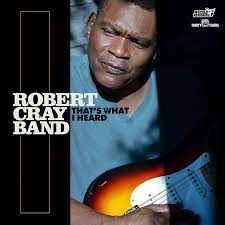 How did the compilation “Groove & Grind: Rare Soul ‘63 – ‘73” influence the making of your “That’s What I Heard” album?
How did the compilation “Groove & Grind: Rare Soul ‘63 – ‘73” influence the making of your “That’s What I Heard” album?
– Advertisement –
Well, you know, Steve Jordan (ed: Rolling Stones, John Mayer Trio -drums) who produced the record for us, sent me an email and said: “You should order this record. It has got some great songs on it”. The first song I heard that it’s on the compilation is “My Baby Like To Boogaloo” (laughs) and I called Steve and said: “Man, we ‘ve got to do this one!” and he says: “Yeah, I know, and I am playing drums on it”. That’s how it started and then from there I just kept listening to the record and then we decided to pick another one (ed: “Do It”) off of that album, that compilation. A great compilation, by the way, it’s a lot of songs that I had never heard of and a lot of groups I had never heard of. When we work together, Steve and I, we are just having a lot of fun and that’s what it’s always been about.
How emotional was it for you to write “To Be With You” on “That’s What I Heard” album as a tribute to your late friend Tony Joe White?
When I put that song together, after it was done, it reminded me of Tony and the time that we spent together doing the “Hi Rhythm” album (ed: “Robert Cray & Hi Rhythm” -2017). I only knew him from that time and some shows that we were able to work together on, afterwards. But in that time that I was able to hang around, he just seemed like one of the most warm and genuine persons that I have ever run across: Just really personable and open. It made you understand how he can write those songs because he was such a warm, open and honest person.
– Advertisement –
I really like your composition “This Man” from the new album. Please tell us a few words about this fantastic song.
Thank you so much for that. Well, you know, what we are going through (laughs) here in the States with that man (ed: Donald Trump) and at that particular time he was the President and I, like a lot of other people, the majority of the people in this country are sick and tired with what had been going on and what it is continuing to go on and I just had to write about it. On the album, the version that you hear is different than what I had when we first went into the studio. We started recording the song in a way that I had written it and then I said to Steve: “I don’t like this” and then we sat together for a moment and we said: “Let’s start with all this percussion”, so we got everybody in the room and got all these percussion instruments and we just started playing percussion and then we said: “This is what we want”. So then, after that, we laid down this percussion track and then we went back in and we just hung on the one chord (laughs) and just went from there. We started to make all these chord changes that I had written before. So, that added to the whole fun of doing that and the emotion, the feeling and the frustration of all that has been going on since that man was our President, just came out.
“Promises You Can’t Keep” is one of the highlights of the album. How did it happen to have Steve Perry (Journey) doing backing vocals on this?
– Advertisement –
You know, that song is written by Steve Jordan, Kim Wilson (ed: The Fabulous Thunderbirds -vocals and harmonica) and Danny Kortchmar (ed: James Taylor, Jackson Browne -guitar). So, they wrote that song and we had recorded it and we were taking a lunch break and there is a room that’s upstairs, above Studio B in Capitol recording studio. I was upstairs and I came back down and there is this guy sitting behind the control desk, in a chair and I was going to my stuff -you know, people would go in and out of the studio- and I was wondering who that guy was (laughs). Then, Steve Jordan came in and he just started talking to him and so did Niko Bolas, who was one of the engineers on this record, they started talking and I realised who was, it was Steve Perry. So, we started listening to the playback after we finished lunch and everything and Steve Perry goes: “You know, it just needs some background vocal” of which Steve Jordan had already been planning to have happened, but Steve Perry was there and said: “I would like to sing background on it” and so he did (laughs) and that’s how that worked out.
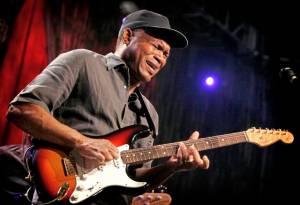 How important was the contribution of Steve Jordan (Rolling Stones, John Mayer Trio –drums) as producer on “That’s What I Heard” album?
How important was the contribution of Steve Jordan (Rolling Stones, John Mayer Trio –drums) as producer on “That’s What I Heard” album?
We ‘ve done a few records now with Steve, three, four, five maybe and it’s great because he knows what we are about, we have similar music tastes but then again Steve knows how to push me into other things such as the song “Aspen, Colorado” that we did on the “Hi Rhythm” record, that is a Tony Joe White tune. It’s something that is out of my bag, but I enjoyed the song: It was one of the songs that he suggested, he knew maybe that I might like it and that’s how Steve and I work. It’s always important to have Steve around because he pushes me and we have a lot of fun together.
Do you think “That’s What I Heard” album is also a good opportunity for younger people to learn about the music of Curtis Mayfield, Bobby “Blue” Bland and The Sensational Nightingales?
I really hope so, you know, and that’s the reason we titled the record “That’s What I Heard”, because I heard that music when I was growing up and it inspired me. Hopefully, people will listen to it and it will inspire them to go and stick out the people that you just mentioned: The Sensational Nightingales, Curtis Mayfield and others and listen to their music and find out what is all about. I mean, that’s the great thing about music: It’s inspirational and it can open your ears to a lot of other things and great ideas and just people who had been around before us. It’s great.
What should fans expect from your upcoming US tour?
We do a little bit of everything from over the years that we ‘ve been a band, so we go back to the “Bad Influence” (1983) record all the way to “That’s What I Heard” and on a nightly basis we change up the setlist to give everybody an idea of what this band is about and all these different faces that this band has gone through. We have a lot of fun, we play some blues, we play some ballads, we play some uptempo and soulful things. We play what we enjoy and hopefully the audiences will enjoy it as well.
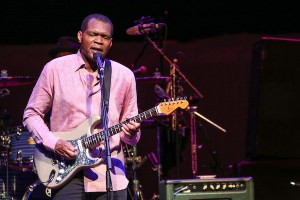 Did you expect the commercial success of “Smoking Gun” single from “Strong Persuader” (1986) album?
Did you expect the commercial success of “Smoking Gun” single from “Strong Persuader” (1986) album?
We had no idea what was gonna happen when we recorded that record. We had taken a couple of months off to record after being on the road. They said: “Come on, we are going to go in the studio” and then we went in the studio and Bruce Bromberg (producer) had the lyric to the song “Smoking Gun” and Richard Cousins (bass) put the music to it. We did the record and we went back on the road. Then, we started hearing these ramblings of a major record label was gonna pick us up. That went around for a while and then all of a sudden we had a record on the radio that we were hearing everywhere (laughs) and that was like: “Wow, this is fantastic!” So, it has opened up a lot of doors for us and we continue to work on the success since that record has been released and the subsequent records following. It’s been great for us.
Could you describe to us your feelings when Albert King covered your song “Phone Booth” (from The Robert Cray Band’s “Bad Influence” album -1983)?
It was a big honour. When we recorded that song, I was envisioning Albert King recording that song and maybe I mentioned it to the producers and think that’s why they went to Albert King with the song. But hearing his version, he did it the Albert King way and it just made me smile big time. It was really cool.
You have played with Stevie Ray Vaughan. What memories do you have from him?
I have a lot of memories of Stevie Ray Vaughan: The first one is the first time I saw him, which was in 1979 at the San Francisco Blues Festival outdoors and Richard Cousins, our bass player and myself, we were standing next to one another because when Stevie came to San Francisco there was a lot of news about this young hard guitar player and we had been booked to do some shows together after the San Francisco Blues Festival. So, I’m standing next to Richard watching Stevie play and Richard elbows me and he goes: “He’s pretty good, isn’t he?” and I said: “Shut up” (laughs). Then, after that, we did several shows together in and around the San Francisco Bay Area and Santa Cruz, California and we became friends and we were friends from that time on. He’s great, he’s a great guy.
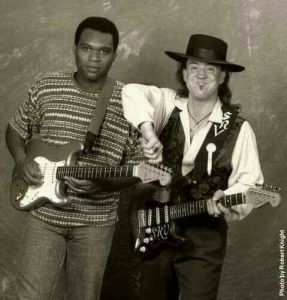 You were on the same bill with Stevie at Alpine Valley just before his death. Was Stevie’s passing a big shock for you?
You were on the same bill with Stevie at Alpine Valley just before his death. Was Stevie’s passing a big shock for you?
Yes, it was. It was a big shock, you know, because we were friends and we did the two shows there at Alpine Valley over a couple of nights and we hadn’t seen one another for a while, so we were just going over what was going on more recently. He told me that he and his brother Jimmie had just recorded the “Family Style” album together that hadn’t come out yet, but they were really excited about that and everything was going well for him. He had recorded with David Bowie on “Let’s Dance” and we were just going over a lot of things that we had been doing, both bands, over the years that we ‘ve met since 1979. So yeah, it was a shock.
I know that you played in “Animal House” (1978) film, you invited John Belushi on stage when you played with Curtis Salgado and you had some role in the creation of the Blues Brothers. What really happened?
Well, Curtis’ band, The Nighthawks and our band, The Cray Band, we were working out of Eugene, Oregon at that time, a college town. We were on stage in a splinter group (ed: The Cray-Hawks) that we had and somebody said to Curtis: “This guy, John Belushi is out in the audience” and we were going: “Who is John Belushi?” and they were laughing because we had never seen Saturday Night Live before, which was a television show that he was on, because we were always working on Saturday nights. So, we meet Belushi and we eventually let him on stage where he does his Joe Cocker impersonation. Then, Curtis became close friends with John and started telling John a lot about the blues people and helped them out with this project they were thinking about doing called the Blues Brothers. But it was Curtis who gave him a lot of the information and the albums to listen to them, one of which was one of my records and just that and stayed in contact with him and The Cray Band with Curtis at the time did a show in Los Angeles and Belushi and Dan Aykroyd came down and saw us performing down there. But it was Curtis basically who influenced Belushi on the Blues Brothers and then when they did the first show on the programme Saturday Night Live, they had an introduction with Paul Shaffer, he was the bandleader on Saturday Night Live at the particular time and he did an impersonation of a television impresario called Don Kirshner and he said: “And with the help of Curtis Salgado and The Cray Band we give you the Blues Brothers” and that was their first show on television.
How much has your approach to guitar changed over the years?
It’s changed in the sense that is more song-oriented than solo-oriented. The song is the most important thing and then when I go back and I listen to stuff that I really enjoy, the music that I do enjoy is more song oriented than it is the guitar playing. The guitar playing is a big part of it, but not the main part of it. It’s the story that is the most important in the music and the guitar soloing is an accompaniment. So, that’s how it has changed for me.
Was it an interesting experience to play with Keith Richards, Steve Jordan, Eric Clapton and others in “Hail! Hail! Rock ‘n’ Roll” film (1987) about Chuck Berry?
(Laughs) Yeah, it was. That was right before the release of “Strong Persuader” and it was great to be in that company. I had done some work with Eric prior to that but I hadn’t with Keith or Steve and to be on the set with Etta James and Chuck Berry, of course. Chuck was really nice to me because I was a young guy on the scene and it was a lot of fun. A great experience.
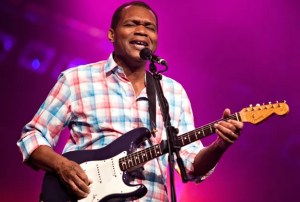 Could you share with us the great story about the cassette in the boombox (cassette player) in Keith Richards’ hotel room in St. Louis?
Could you share with us the great story about the cassette in the boombox (cassette player) in Keith Richards’ hotel room in St. Louis?
(Laughs) Yeah, because when we first got together we were in Keith Richards’ hotel room having a band meeting and everything and there was a boombox on the mantel above fireplace and I went over to it and there was a copy of “Strong Persuader” which it had not been released yet. I looked at it and I go: “What you’ve done with this?” and he said: “I’m a Rolling Stone, I have everything” (laughs). It was just funny, but I guess a copy was given to him prior to the release, so it was cool. It was just a cassette, it didn’t have a cover or anything. It was great.
How important is improvisation to you?
It’s really important because it’s a moment in time, it’s a moment in the present. It’s where you are, it’s how you feel in the middle of the song however you play. I mean, then that’s how you should react; you should react to where you are in a moment and that’s what I try to do when it’s time for a solo.
Are you optimistic about the future of blues?
Well, I am but I also understand that blues has changed and it will continue to change just like everything else in the world changes. We don’t have Muddy Waters, we don’t have Howlin’ Wolf, we don’t have John Lee Hooker, we don’t have Elmore James, we don’t have BB King. That was the time and the era and the lifestyle that they lived and the lives that they led and lived in the time. Everybody is different now, it’s a different world. You react, you play and you live in a moment that you are in, right now. So, it’s great to ‘ve been able to have worked with some of these people. It’s great to have the recordings to listen to and like we mentioned before with “That’s What I Heard” with Curtis Mayfield and Sensational Nightingales, we play this music and hope that people would go back and listen to those people and the ones that we are mentioning now: Wolf, Muddy Waters and everybody. We are lucky to have recordings of all those people.
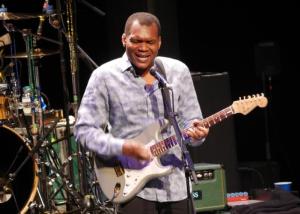 There are no solos on classic blues songs such as “Little Red Rooster” (Howlin’ Wolf -written by Willie Dixon), “Boom, Boom” (John Lee Hooker), “Baby What You Want Me to Do” (Jimmy Reed), “Got My Mojo Workin’” (Muddy Waters). Do you think the blues has become too flashy?
There are no solos on classic blues songs such as “Little Red Rooster” (Howlin’ Wolf -written by Willie Dixon), “Boom, Boom” (John Lee Hooker), “Baby What You Want Me to Do” (Jimmy Reed), “Got My Mojo Workin’” (Muddy Waters). Do you think the blues has become too flashy?
Like I just mentioned before, it’s the story that is the most important thing, the music is an accompaniment. It shouldn’t be like you are saying, I agree. You are losing the meaning of the song if it’s all about flash and soloing, because it’s not that, it’s about the story. People wrote these songs about their lives: Their lives weren’t at all flash and guitar heroics. The stories are the most important, that’s the thing that everybody needs to remember.
You ‘ve said that you had an embarrassing moment on stage with BB King at Crossroads Festival when Eric Clapton and Jimmie Vaughan were waiting to get on stage. Could you tell us the story?
Oh, yeah! Yeah, you know, we just got carried away. We were with BB and we sang -I forget what song it was-, while they were supposed to come out and sing some verses and play as well and we just went on and we kept going. And that’s how it was: Sometimes BB does what BB does and out of respect, I went along with what BB was doing and you can’t tell BB “no” (laughs).
Did you enjoy doing Sam Cooke’s “A Change Is Gonna Come” with Tina Turner live in 1987?
Oh yeah, that was fantastic. It was great. We were able to do a bunch of shows with Tina Turner over the years and especially doing these summer outdoor shows and indoor shows and things like that. I was able to do that “A Change Is Gonna Come” with her, it was great. I just watched a part of the Grammy show the other night and they did a little tribute to Tina, which was great.
“4 Nights of 40 Years Live” (2015) DVD is incredible. Does this release capture the true spirit of a Robert Cray Band concert?
Yeah, there was a certain time, there was that particular band at the time, with Tony Braunagel playing drums and Steve (ed: Jordan) was there and a few other guests. It was great. We had a really good time making that record. Yeah, that’s the way I look at most other recordings as different times and different periods of the band, with different personnel and where we were at at that particular time. So, that was great.
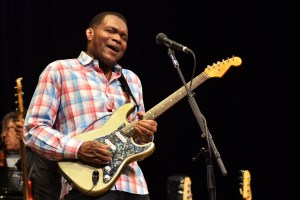 You participated on three John Lee Hooker’s albums. What was it like to play with such a legend?
You participated on three John Lee Hooker’s albums. What was it like to play with such a legend?
He was a great friend. We were with the same booking agency at the time, so we did a lot of shows together. As a matter of fact, in 1982 or 1984 I got my first opportunity to go to Japan with John Lee Hooker and have his band backing me up and I was the opening act, of course. So, we became friends and John Lee sometimes would call me on the phone and tried to impersonate a voice that wasn’t his, a female voice (laughs) : “Hello, is Robert there?” and you ‘d know it was him. He was great and it was just great to have been able to have had the opportunity to record with him because he was always a good guy and a lot of fun to be around. It was an honour to have been able to have known him.
What was your reaction to the online campaign that Vernon Reid (Living Colour -guitar) started to boost the followers on social media accounts of legends like you and Robin Trower ?
That was fantastic! That was great! That’s a really cool thing that he finally did. I appreciate that and that’s a really cool thing to have done and it helped us out, quite a bit. It’s great.
How much impact did the Jimi Hendrix shows you watched have on you as a teenager?
Ha! It was huge. I had been playing guitar for two years and then I heard “Purple Haze”, but not by Hendrix: We were at high school and he had an assembly and this local high school band played at the assembly and played “Purple Haze” and I go: “What is that?!” and so, there is one guy I knew whose brother was in that band, he told me it was a Jimi Hendrix song. I ordered that record and I got it and it was completely different. I hadn’t heard any sounds like that before and so it was amazing. Then, I got to see Hendrix twice and his music was just completely different than anything that I heard and it was great. It was a time when you are younger you listen to a lot of different things and it was so intense, beautiful and really cool music. It still is.
Jimi Hendrix’s music, George Harrison’s music, Santana’s music, had also a very strong spiritual aspect. Is today’s music spiritual?
It all depends, I guess, on who the player is. Carlos is like that, like you mentioned and he’s always been that way. Hendrix’s music is like that, John McLaughlin’s music is like that. It all depends on the player.
Is it a bit surreal that former President Barack Obama is a fan of yours?
That’s what he told me when I had the opportunity to meet him once. We were given an introduction, we were in an introduction line and the guy says: “Mr. President, this is Robert Cray” and he goes: “I know Robert Cray. I got him on my iPod!” (laughs) So, that was pretty cool.
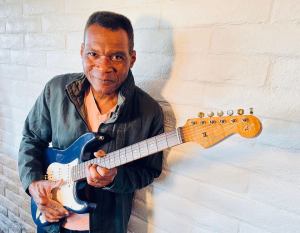 Do you think because of the streaming services listening to an album from start to finish is now becoming a kind of lost art?
Do you think because of the streaming services listening to an album from start to finish is now becoming a kind of lost art?
It is. I mean, when you think about it: When you put together an album of recorded music, you put it in sequences that you hope people would listen to from one end to the other and this is all being wasted now, because you can get what you want and even on the streaming services they are doing the same thing with music from other people and other genres (laughs). They are playing a sequence for you that they think you might like. So, it’s kind of crazy.
Ron Carter (Miles Davis Quintet) told me: “The first take in the studio is always the best, because the first time you play the music, the second time you play yourself”. Do you agree with this?
I have to agree with it because you start thinking too much after the first one. You think you are going to improve it but this is not always the case, so you more likely get your best performance at your first take. I have to agree.
Is it possible to play in Greece soon?
You know, we ‘ve never been and I hope that sometime in the future that we can come to play. I remember years ago when Albert Collins was with us, he told me that he had the opportunity and I’ve always wanted to come.
A huge “THANK YOU” to Mr. Robert Cray for his time. I should also thank Kim Slagle for her valuable help.
Official Robert Cray website: https://robertcray.com/
Official Robert Cray Facebook page: https://www.facebook.com/robertcraymusic
Official Robert Cray Twitter page: https://twitter.com/RobertCrayBand
[ad_2]
Source link

